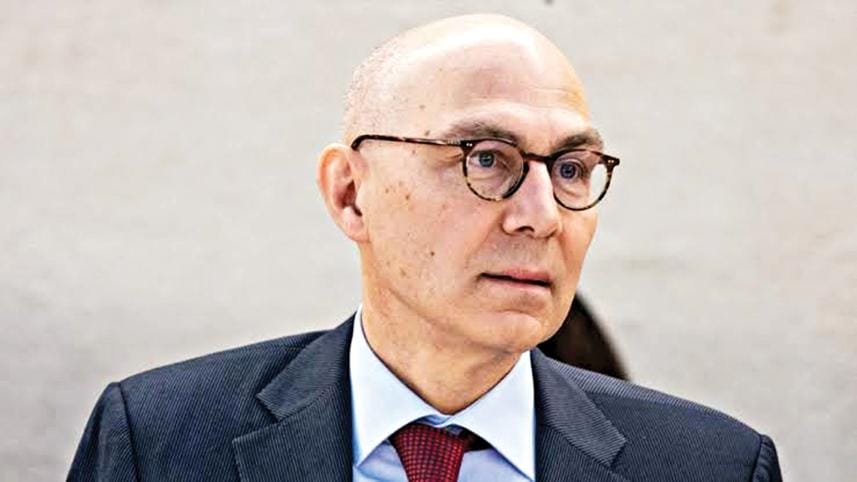Focus should also be on healing, reconciliation

"It is absolutely critical to overhaul and dismantle the repressive laws and institutions that were there for much too long."
Bangladesh must focus not only on accountability but also healing and reconciliation, said Volker Turk, the United Nations High Commissioner for Human Rights at a press conference in Geneva yesterday.
"I think it's a historic opportunity for the country to stop the cycle of reprisals that we have seen in the past, to bring the nation together, to engage in trust building and healing," said Turk.
He said the process of healing must involve truth telling, reconciliation, memorialisation, and reform. He called it a unique chance for every citizen of Bangladesh, irrespective of whatever group or community they belonged to.
"It's a huge chance for the country and its people to deal with its past, to overcome its past, to reach a moment of healing and truth-telling. And that includes each and everyone within the society of Bangladesh. It includes people from different religious and ethnic groups. It is one country. It is one citizenship."
Turk said that if all groups and political parties have the spirit to make this happen, "[...] the world will have a story of hope to tell in what is otherwise, frankly, a very difficult environment all over the place."
Citing the UN fact-finding report, Turk said the UN had reasonable grounds to believe that crimes against humanity were committed, directed against protesters during the July-August massacre that killed 1,400 and injured thousands.
"It is absolutely critical to overhaul and dismantle the repressive laws and institutions that were there for much too long."
He called on the international community to aid Bangladesh in its rebuilding efforts.
"I had a chance to meet a number of the victims. I went to one of the hospitals in Bangladesh, and I could see and witness myself how many people, and particularly young people and children, have been affected by what happened. They were still in treatment when I was there in November, and some of them have life-altering injuries.
"We need resources for victim-centered reparation programmes, for compensation, long-term medical treatment, rehabilitation, care and livelihood opportunities for victims. We also need member states to support us in this effort.
"We need truth-telling about the fate of the disappeared people, because that brings closure for the families and the loved ones. It is a part of this victim-centered approach."
He said the recommendations provided in the UN report were crucial for ensuring the country's future stability, protecting human rights and strengthening democracy. He also said his office was in the process of finalising a physical presence in Bangladesh to provide support and technical cooperation on all the areas of reform.
Law Adviser Asif Nazrul said, "The collective resolve of the people of Bangladesh for a just, inclusive and functioning democracy with the promotion and protection of human rights at its core, should define Bangladesh of the future and place our nation as a responsive and responsible state in the global community."
Mir Snigdho, the brother of Mir Mugdho who was shot and killed during the protests, said, "The international community must do more than just issue statements. International bodies must enforce accountability, and civil society must push for lasting change from this tragedy. Decisive action is needed, supporting independent investigations, enforcing consequences for non-compliance, and ensuring justice mechanisms.
"Justice is not a single act but a process, one that demands prosecution, truth-seeking, reparations and institutional reforms for victims. Justice means accountability, not just for those who pull the trigger, but also for those who gave the orders," he said, adding that despite progress, gaps remain.
"Many victims still wait for their voices to be heard, while others have lost faith in a system that has failed them repeatedly. These gaps mean continued trauma, social divisions and the risk of history repeating itself.
"Political interests must never overshadow fundamental human rights. Symbolic gestures are not enough. The government must strengthen domestic justice systems."
He said that accountability is not just about addressing past crimes. "It is about shaping a future where such violent acts are never tolerated again. If we fail to act, we send a message that impunity is acceptable.
"We don't stop when we are tired. We stop when we are done,"
Farhana Sharmin, an architect who had managed a group of 650 volunteers to care for injured protesters, spoke about the need to have long-term solutions to care for the injured.
"One of the greatest challenges we encountered throughout the last seven months was deep-rooted inequality. One bullet, one injury, does not just harm one individual. It devastates an entire family. Over 90 percent of those affected come from poor, lower-middle and middle-class backgrounds. Compensation alone cannot address their sufferings or secure their futures," said Sharmin.
UN Human Rights Spokesperson Ravina Shamdasani moderated the event.



 For all latest news, follow The Daily Star's Google News channel.
For all latest news, follow The Daily Star's Google News channel.
Comments